Here’s something to think about: sponges are among the most essential household supplies that are destined for the landfill. They often come wrapped in or are made of plastic. They get really gnarly and stinky. They cannot be recycled or composted.
For many years as an adult, I used the brand of sponge that was omnipresent in the household I grew up in. It was a yellow rectangle of soft foam encased within a plastic mesh. In time, holes would appear in the mesh and grow until the innards began to protrude. Miraculously, that foam never deteriorated, but without the scrubby exterior intact, its main utility was no more. Destination: trash.
The quest for a less wasteful and more sustainable sponge was fruitless for years. Then I found it, an alternative manufactured by a long-established brand. But something about that sponge left me with niggly feelings. Trust was blown. I had succumbed to greenwashing. I returned to the reliable and strangely comfortable brand from childhood. At least it was packaged in card stock that could be recycled.
But life has a way of leading you to what you seek. You have to be patient and keep your eyes open. That little formula and the passing of time gradually led me to sustainable and zero waste wiping, scrubbing, and sponging options I love. I think you may be intrigued by them, and perhaps after trying them out, feel a little swoony, too!
[Disclaimer: All products mentioned below are things I am truly excited about and have been using in my own home for years. I do not receive kickbacks or otherwise from their producers for featuring them. I simply want to share these awesome alternatives and nudge people toward zero waste options.]
A zero waste alternative for paper towels? Sure!
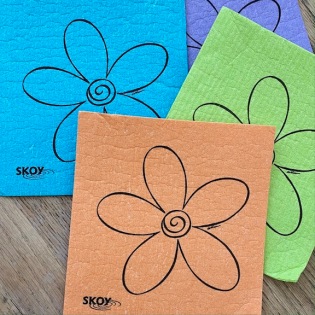 Those who know me well also know how little I enjoy recreational retailing and browsing. Considering my profession, most people are surprised by my aversion to visiting The Container Store, Mecca for those of us in the organizing industry. Ninety-nine percent of my store visits are targeted, purposeful, and brief.
Those who know me well also know how little I enjoy recreational retailing and browsing. Considering my profession, most people are surprised by my aversion to visiting The Container Store, Mecca for those of us in the organizing industry. Ninety-nine percent of my store visits are targeted, purposeful, and brief.
The total number of times I’ve wandered their aisles for “fun” can be counted on one hand, but admittedly, those times have proven to be useful research expeditions. Staying apprised of the latest organizing products is super low on my list of priorities, but keeping an eye out for sustainable alternatives is what motivates me to invest time scoping out the shelves and displays in a place that makes me wish I was somewhere else. It was during one of those exploratory meanderings that led me to my favorite multi-purpose paper towel-like, but way more absorbent than a cloth towel replacement, Skoy Cloth.
These are the real quicker picker uppers, and they do their job counterintuitively. Skoy Cloth work best when wet. Got a spill to clean up? Dampen a cloth under the faucet, squeeze out the excess water, and then wipe up the liquid. Repeat the squeeze and wipe routine until the previously wet surface is dry. They are great, too, for wiping up dust, picking up small or stubborn crumbs, and whatever else your cleaning heart desires.
Made of “natural cotton and wood-based cellulose pulp,” the cloth can be cleaned in the washing machine and air dried with the rest of the laundry. Unlike paper towels which can occupy prime real estate on a countertop or inside cabinets, one package of these clothes takes up negligible space beneath the kitchen sink or wherever you store cleaning supplies. “Using a Skoy Cloth is equivalent to using 15 rolls of paper towels in an average home,” states the website. When they wear too thin and start getting holes, into the compost they go. Voila!
Military armor for scrubbing cast iron? But of course!
 Back in the days of those plastic yellow scrubby sponges, once they wore to the point of complete annoyance for handwashing dishes, they were deployed for use elsewhere before being meeting their final fate. One was inevitably demoted to the job of scrubbing the cast iron skillets.
Back in the days of those plastic yellow scrubby sponges, once they wore to the point of complete annoyance for handwashing dishes, they were deployed for use elsewhere before being meeting their final fate. One was inevitably demoted to the job of scrubbing the cast iron skillets.
When I first read about chain mail scrubbers for cast iron, I did a bit of investigating online and decided to give one a try. Finding them at the hardware store was a great score.
This is a solid workhorse. I cannot imagine how much weight actual horses carried around when a medieval soldier was clad in the stuff.
Gooped up cast iron pans, glass baking dishes, and stainless steel cookware clean up with a lot less scrubbing than the old days. It’s infinitely reusable and easy to wash: rub it between your hands with a drop of soap and some water.
Zero waste sponges? YES!!! They DO exist!!!
 I found these beauties during a visit to my favorite spot in the town of Petaluma – The Seed Bank – back when they were located in the historic former Sonoma County Bank. (Yes, it was a brilliant reuse of the space.) The info on the back of the brown paper wrapper indicated it was my first ever out in the world encounter with an actual Fibershed certified product. That fact alone made this an automatic no questions asked purchase.
I found these beauties during a visit to my favorite spot in the town of Petaluma – The Seed Bank – back when they were located in the historic former Sonoma County Bank. (Yes, it was a brilliant reuse of the space.) The info on the back of the brown paper wrapper indicated it was my first ever out in the world encounter with an actual Fibershed certified product. That fact alone made this an automatic no questions asked purchase.
The word “fibershed” entered my lexicon in 2012 via an awesome panel discussion hosted by CUESA (Center for Urban Education about Sustainable Agriculture) that featured Rebecca Burgess, the woman who coined the term and started a project of the same name before it evolved into the nonprofit it is today.
Fibershed is a non-profit organization that develops regional and regenerative fiber systems on behalf of independent working producers, by expanding opportunities to implement carbon farming, forming catalytic foundations to rebuild regional manufacturing, and through connecting end-users to farms and ranches through public education.
These sponges are unlike any other. They are Transitional Climate Beneficial™:
Fibershed’s Climate Beneficial™ Verification program and label supports farmers and ranchers in landscape level stewardship that centers the work to build healthy soil. We focus on engaging producers and developing financial and technical support to enhance the drawdown of carbon from the atmosphere.
To say I love these fuzzy , locally grown, carbon sequestering squares of wool is an understatement. The hand feel is a texture previously unfamiliar to any dishwashing experience. Wool is naturally antifungal and antimicrobial, so that awful and familiar sponge funk has never been an issue. Unlike standard sponges, they do shed during the first week or so of regular use and can coat fingers, sink, and drain with a light woolly web. As one might imagine with a wool pad, the fibers become more compacted with use as the sponge shrinks to its working size.
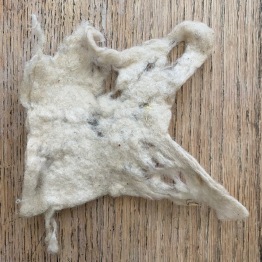 In my dishwasher-free home, this essential tool is used several times a day, so I can confidently report it takes many many months for the sponge to reach a point of no return. Somehow it’s less annoying than a conventional sponge as it begins to disintegrate. The demise of a wool sponge can be quite sculptural, like a felting project gone awry.
In my dishwasher-free home, this essential tool is used several times a day, so I can confidently report it takes many many months for the sponge to reach a point of no return. Somehow it’s less annoying than a conventional sponge as it begins to disintegrate. The demise of a wool sponge can be quite sculptural, like a felting project gone awry.
At the end of its useful life*, a spent wool sponge can go in the compost bin. You can also tear up and sprinkle the pieces in your yard (or a discreet outdoor spot if you are yardless) for critters to take home to their nests.
The brown wrapper can be used, too. The plain back side is instant scrap paper for jotting down a grocery list or two before it’s recycled (or composted if it gets wet).
Tying it all together
There you have it, my selection of zero waste cleaning helpers with minimal and recyclable packaging. And there is one more cleaning tool that kind of goes without saying, but must be said: your hands. Your fingertips can wipe away gunk just as well as a sponge. For goodness sake, it’s only food residue and water!
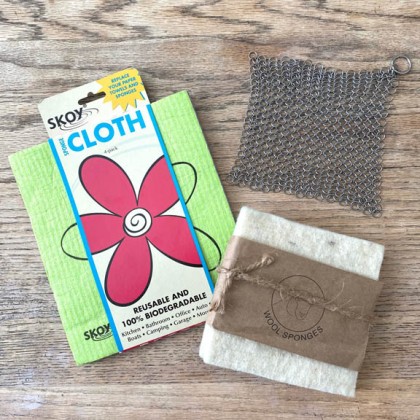
~~~~~~~~~~~~~~~~~~~~~~~~~~~~~~~~~~~~~~~~~~~
*I was hoping to report on a new “disposal” alternative after learning about Matter of Trust’s Clean Wave Program. According to their website, they accept “donations of hair, fur, fleece clippings, feathers, laundry lint… from individuals, salons, groomers, farmers… We manufacture felted mats products that soak up petrochemicals and help keep waterways clean.” What??? Yeah! Bummer is I’ve made several attempts to reach out via their website and social media accounts to no avail. I’ll keep trying, and if you try and hear back, let me know!
**UPDATE** Nevertheless, I persisted. Since this post was written, I new have a contact at Matter of Trust, and have confirmed they are accepting donations!!! See my Instagram post about my hair donation.


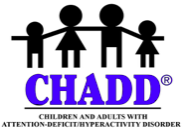
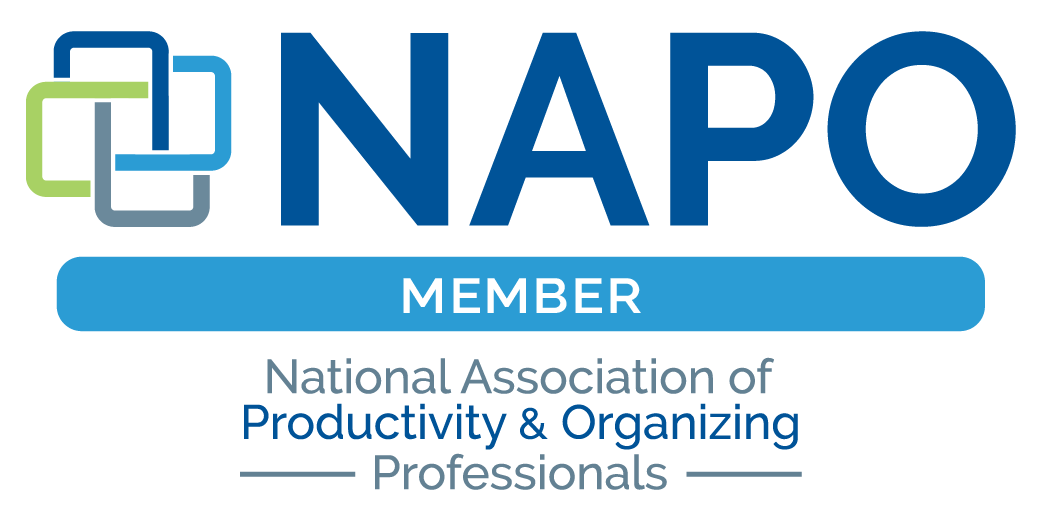


Awesome, Deb— love these and how you’ve presented them. They save money too, plus space in our cleaning closets. And fewer shopping trips.
I especially love how wool is “naturally antifungal and antimicrobial”! And can be composted and make nests.
The metal pad doesn’t scratch? Maybe it wouldn’t matter with cast iron, but I wonder about stainless steel and glass. I use walnut scrubbing pads, though they’re made with recycled PET which ends up in landfills. So at least the metal pad would outlast the walnut pad.
The metal does not scratch stainless steel or glass. It will scratch enamel or ceramic surfaces.